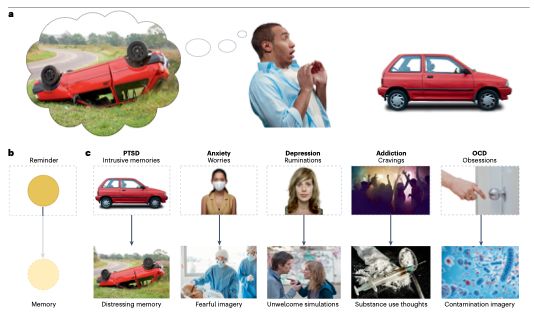sounds cool! I wonder, though, what to make of this in relation to the idea that prediction error enhances memory? E.g., www.sciencedirect.com/science/arti...

Does prediction error drive one-shot declarative learning?
The role of prediction error (PE) in driving learning is well-established in fields such as classical and instrumental conditioning, reward learning a…
www.sciencedirect.com
thanks...i can see it now. But still can't save a pdf on my machine....it's restricted.
Sadly, I am blocked by a Paywall...I guess the University of Cambridge doesn't get this journal? Any other way I can get it?
This sounds interesting. I look forward to seeing your paper. Do you have any papers on the grid world approach you are taking (sorry if I should know about this). Demonstrating the consequences of intrusive thinking computationally is important and useful, and I know of no other similar work.
You raise a fair point which the data cannot address. Overall perf. levels on recall were similar across groups, but episodic memory ability need not equate to cognitive control ability. Causal manipulations of control training needed. Only thing that comes close is www.science.org/doi/full/10....
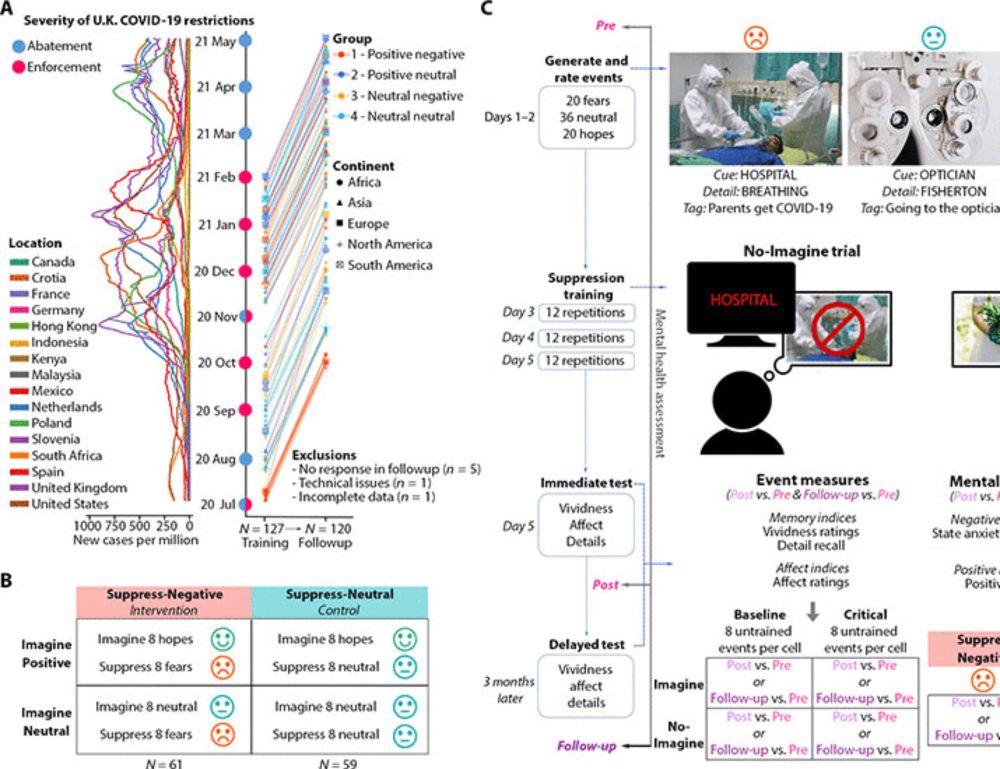
Improving mental health by training the suppression of unwanted thoughts
Training people to suppress fearful thoughts improved mental health, especially for those with anxiety and post-traumatic stress.
www.science.org
Incidentally, college students with a greater childhood history of traumatic experiences show greater suppression-induced forgetting than those who have no such history, according to Justin Hulbert & Mike Anderson (see our JEP G paper from 2018 or so).
Can you explain what you mean by "did better"? And regarding the latter point, do you mean that replaying negative events essentially provides an opportunity to learn control behaviours? (not quite sure what you meant).
If intrusive thoughts warp cognitive maps in PTSD, does inhibitory control "unwarp them" or at least prevent warping? It would be interesting to see what the impact of control would be. BTW...apropros inhibitory control and intrusive thoughts, see our recent paper. doi.org/10.1038/s415...
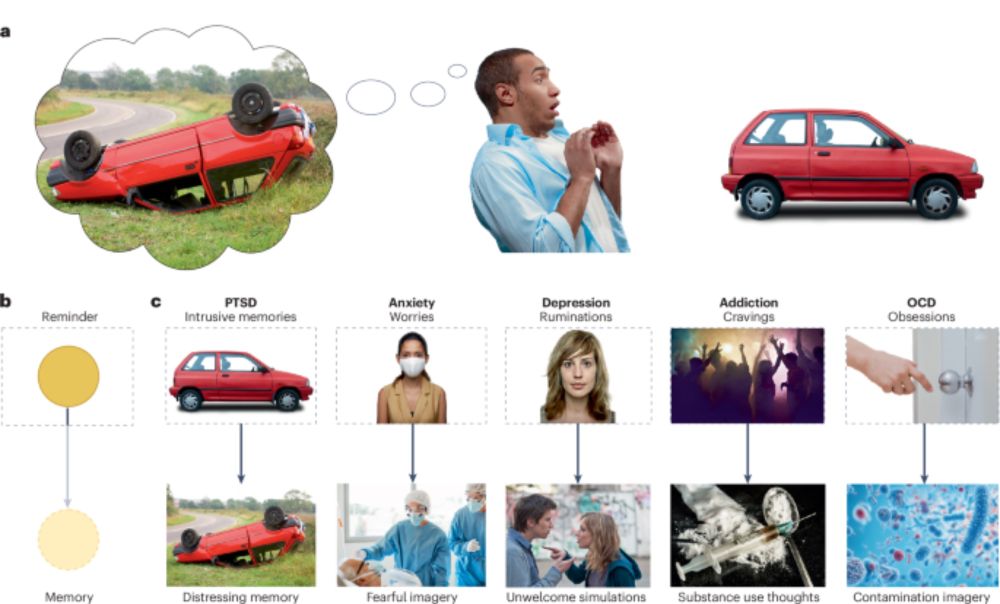
Brain mechanisms underlying the inhibitory control of thought - Nature Reviews Neuroscience
The capacity to prevent unwanted thoughts is important for cognitive function and mental health. Anderson et al. describe insights into the neural mechanisms of the inhibitory control of thought that ...
doi.org
Reposted by: Michael Anderson
Amazing #RegisteredReport led by Sumaiyah Raza from @mrccbu.bsky.social.
We (again) found evidence against a memory benefit of spatial novelty. However, this time we did find a retroactive benefit of rest, which highlights that more work is needed here.
journals.sagepub.com/doi/full/10....
We (again) found evidence against a memory benefit of spatial novelty. However, this time we did find a retroactive benefit of rest, which highlights that more work is needed here.
journals.sagepub.com/doi/full/10....

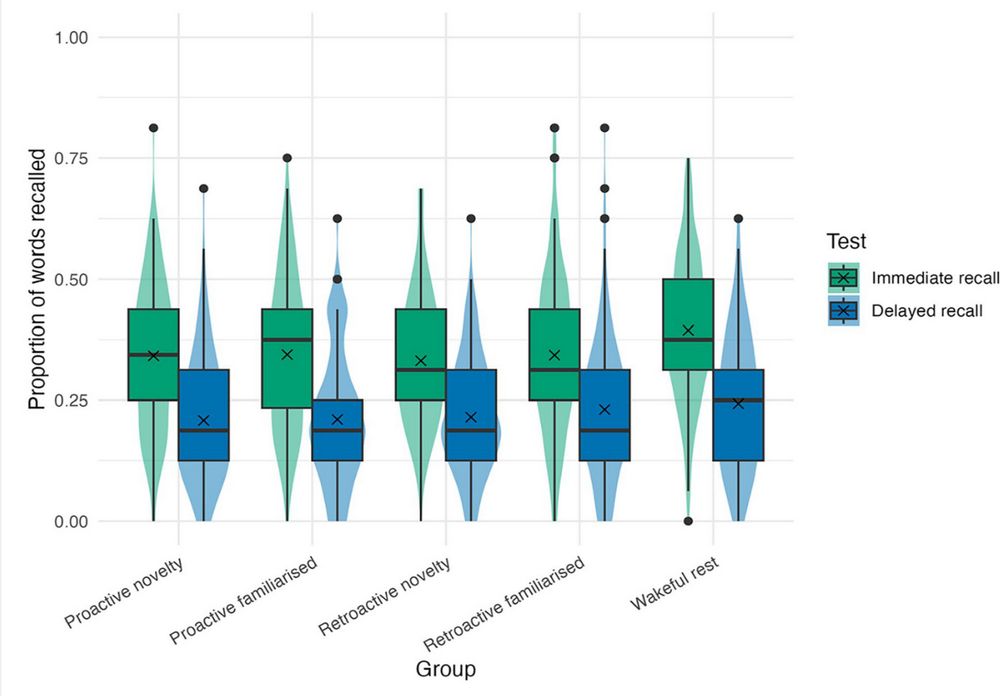
To my complete surprise, our Nature Reviews Neuroscience review on the Brain Mechanisms Underlying the Inhibitory Control of Thought has landed on the cover! Cover art below! For an "explainer thread", see earlier tweet. bsky.app/profile/memo...
@mrccbu.bsky.social
#neuroskyence #memory #ptsd
@mrccbu.bsky.social
#neuroskyence #memory #ptsd

When I first started working with resting state fMRI as a postdoc, there was a lot of skepticism about what we could learn from it. 20 years later, it's hard to imagine where the field of neuroscience would be without it. Here's a summary 🧠 www.nature.com/articles/s41...

The history and future of resting-state functional magnetic resonance imaging - Nature
This Review provides an overview of the history of resting-state functional MRI research, which has helped to reveal the spatiotemporal organization of the brain, and discusses how it can contribute f...
www.nature.com
This looks shockingly useful. Thanks, on behalf of the field!!
CLaE
@claeneuro.bsky.social
· May 26
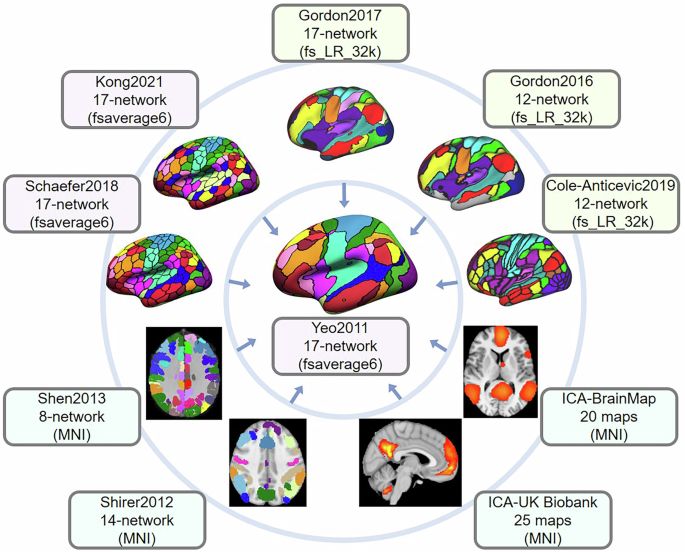
A network correspondence toolbox for quantitative evaluation of novel neuroimaging results - Nature Communications
Here, the authors present the Network Correspondence Toolbox, which enables researchers to examine and report spatial correspondence between their neuroimaging results and widely used brain atlases.
www.nature.com
I'm not sure BlueSky is declining...perhaps I missed the discussion that led up to this. For example, this Times Higher Ed piece suggests it is doing well, as far as Science is concerned. www.timeshighereducation.com/news/xs-domi...

X’s dominance ‘over’ as Bluesky becomes new hub for research
Data indicates more scholars turning to alternative social media site to post about their work after Elon Musk’s Twitter takeover
www.timeshighereducation.com
Reposted by: Michael Anderson
Brain mechanisms underlying the inhibitory control of thought — a Review by Michael C. Anderson, Maite Crespo-Garcia & S. Subbulakshmi
@memorycontrol.bsky.social
www.nature.com/articles/s41...
#neuroscience #neuroskyence
@memorycontrol.bsky.social
www.nature.com/articles/s41...
#neuroscience #neuroskyence
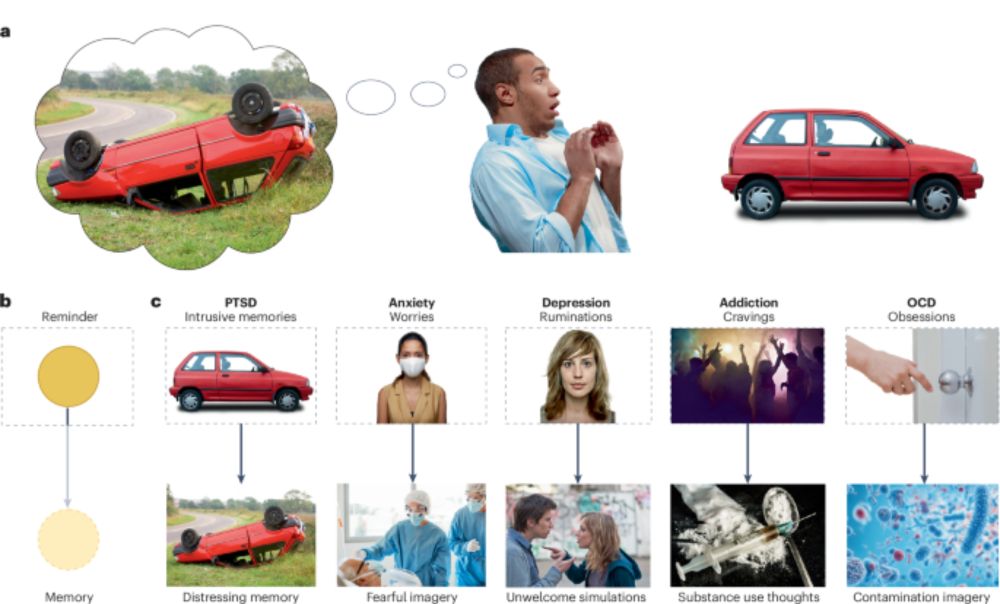
Brain mechanisms underlying the inhibitory control of thought - Nature Reviews Neuroscience
The capacity to prevent unwanted thoughts is important for cognitive function and mental health. Anderson et al. describe insights into the neural mechanisms of the inhibitory control of thought that ...
www.nature.com
Reposted by: Michael Anderson
Nature Communications
A network correspondence toolbox for quantitative evaluation of novel neuroimaging results
www.nature.com/articles/s41...
A network correspondence toolbox for quantitative evaluation of novel neuroimaging results
www.nature.com/articles/s41...

A network correspondence toolbox for quantitative evaluation of novel neuroimaging results - Nature Communications
Here, the authors present the Network Correspondence Toolbox, which enables researchers to examine and report spatial correspondence between their neuroimaging results and widely used brain atlases.
www.nature.com
We hope that our integrative review of retrieval stopping will lay the groundwork for further advances in addressing the distress of intrusive thinking.
The participants produced an important volume on this subject that lays out the mission of addressing intrusive thoughts and its importance, from diverse perspetives.
esforum.de/publications...
esforum.de/publications...
Intrusive Thinking - ESForum
esforum.de
Addressing intrusive thinking is a vital mission in clinical neuroscience and psychiatry. Several years ago, 40 scientists from around the world gathered in an Ernst Strugman forum on Intrusive thinking, organised by Peter Kalivas and
@mpwpaulus.bsky.social and facilitated by Julia Lupp.
@mpwpaulus.bsky.social and facilitated by Julia Lupp.
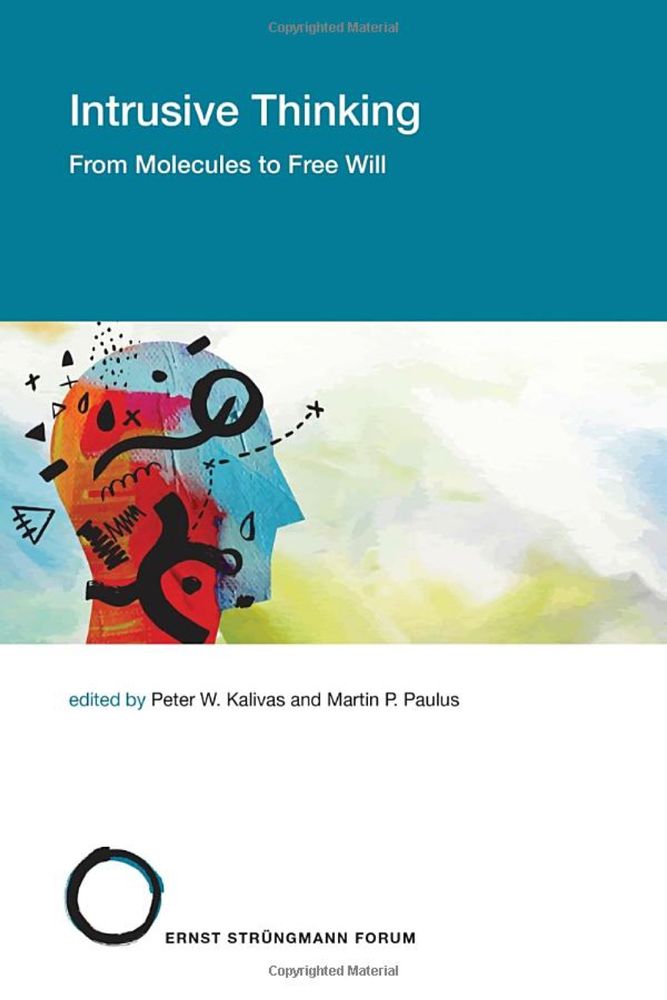
Research on inhibitory control over memory provides a rich neurocognitive framework through which to understand disordered thought control.More broadly, it complements response inhibition as a tool for understanding the control of action and thought.
Fundamentally, if neuroscience is going to inform how unwanted thoughts are controlled by the brain and address central features of psychiatric disorders, a theoretically valid construct and set of tools for measuring that construct are needed.
We also discuss the idea that affective stopping engages the same domain general prefrontal components as retrieval stopping, providing an account of fear extinction's benefits. @stevemaren.bsky.social en.bsky.social �½� joeydunsmoor.bsky.sococial @thephelpslab.bsky.social
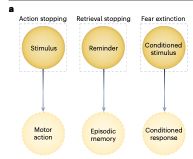
These benefits of thought suppression contradict clinical wisdom about the inadvisability of thought suppression. Yet, they are consistent with the (also popular) notion that inhibitory control is fundamental to coping with perseverative thoughts and with resilience broadly. lir-mainz.de/en/home
Home | LIR Mainz - Leibniz-Institut für Resilienzforschung
lir-mainz.de
Critically, we review evidence that retrieval stopping of unwanted thoughts plays an important role in attenuating affective responding to suppressed content, and also that training people to suppress fearful thoughts improves their mental health. www.science.org/doi/10.1126/...

Improving mental health by training the suppression of unwanted thoughts
Training people to suppress fearful thoughts improved mental health, especially for those with anxiety and post-traumatic stress.
www.science.org
In another example, hippocampal subfield CA1 volume predicts prefrontal suppression of hippocampal activity during intrusions in a retrieval stopping task, and CA1 volume reduction also predicts intrusive symptoms in people with PTSD. www.sciencedirect.com/science/arti...
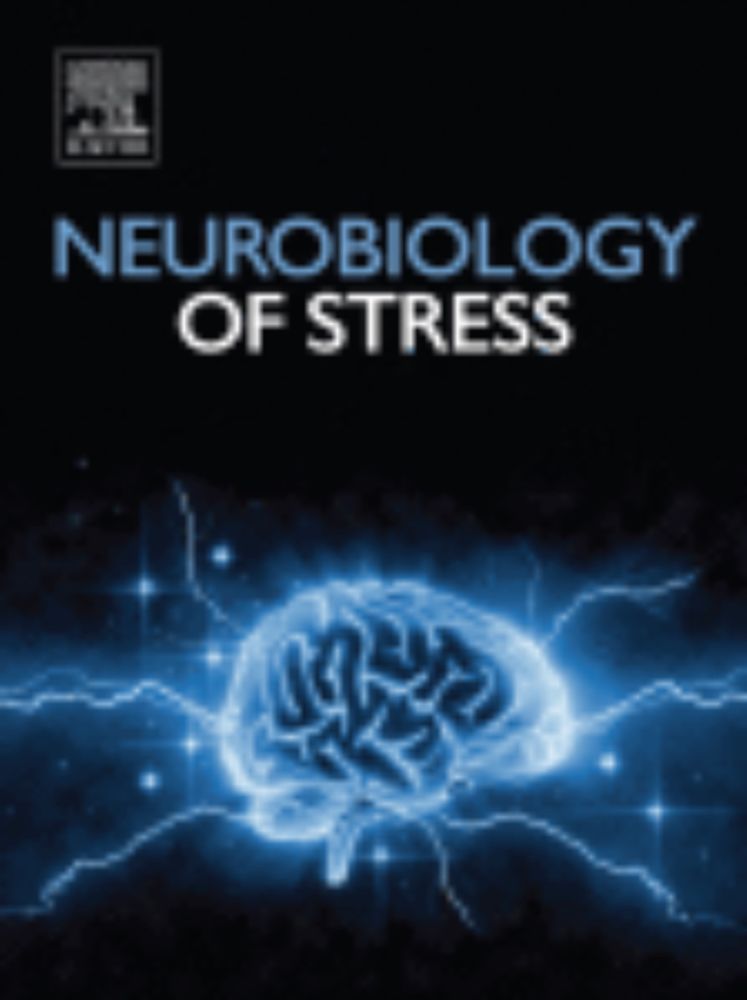
Variations in response to trauma and hippocampal subfield changes
Models of posttraumatic stress disorder (PTSD) suggest that the hippocampus is key to the persistence of traumatic memory. Yet very little is known ab…
www.sciencedirect.com
For example, successful thought stopping is strongly influeced by concentrations of GABA in the hippocampus, that enable hippocampal down-regulation to occur, when people suppress retrieval. www.nature.com/articles/s41...
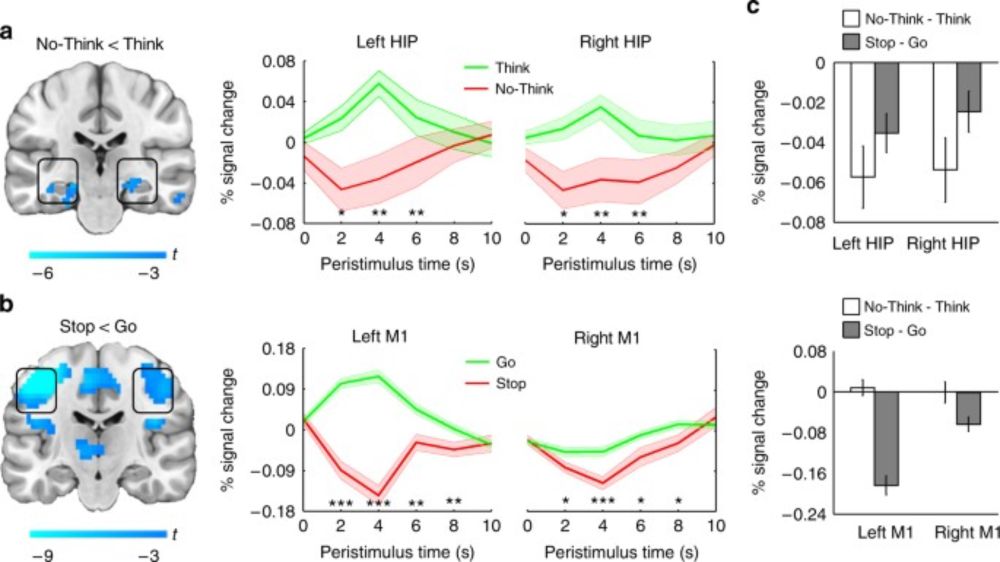
Hippocampal GABA enables inhibitory control over unwanted thoughts - Nature Communications
It is not fully understood how intrusive or unwanted memories are regulated. Here the authors show that hippocampal GABA concentrations, and coupling between the dorsolateral prefrontal cortex and hip...
www.nature.com
To capture this fundamental difference, we introduce the concept of a FRONTO-TEMPORAL INHIBITORY CONTROL PATHWAY to capture what is distinct about mental control. This pathway has unique parameters that dictate thought stopping success that are not captured by response inhibition.
Our article integrates 25 years worth of research on the cognitive and brain mechanisms underlying retrieval stoppping. Retrieval stopping shares prefrontal and striatal components with action stopping, but instead modulates hippocampal and cortical regions that represent thoughts.
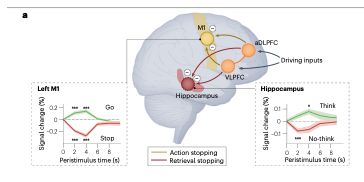
Indeed, persistent intrusive thoughts are usually retrieved in response to reminders. If so, stopping unwanted thoughts would involve recruiting inhibitory control to stop their retrieval, given a cue. This conceptualization captures every form of intrusive symptom across psychiatric disorders.
